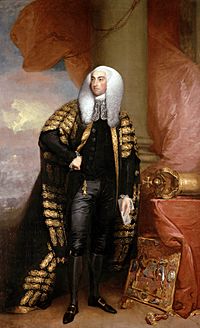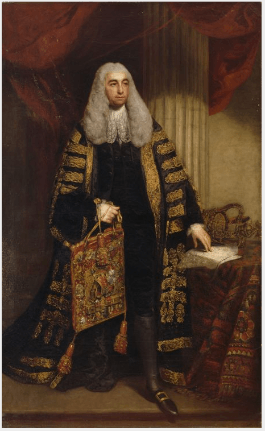John FitzGibbon, 1st Earl of Clare facts for kids
Quick facts for kids
The Earl of Clare
PC (Ire)
|
|
|---|---|

portrait by Gilbert Stuart
|
|
| Lord Chancellor of Ireland | |
| In office 20 June 1789 – 28 January 1802 |
|
| Monarch | George III |
| Preceded by | The Viscount Lifford |
| Attorney-General for Ireland | |
| In office 29 Nov 1783 – 20 June 1789 |
|
| Preceded by | The Viscount Avonmore |
| Succeeded by | The Viscount Kilwarden |
| Member of Parliament for Kilmallock |
|
| In office 1783–1790 Serving with John Armstrong
|
|
| Preceded by | John Finlay William Christmas |
| Succeeded by | Charles Bury John Armstrong |
| Member of Parliament for Dublin University |
|
| In office 1778–1783 Serving with Walter Hussey-Burgh
|
|
| Preceded by | Walter Hussey-Burgh Richard Hely-Hutchinson |
| Succeeded by | Lawrence Parsons Arthur Browne |
| Personal details | |
| Born | 1748 Donnybrook, Dublin, Kingdom of Ireland |
| Died | 28 January 1802 (aged 53) 6 Ely Place, Dublin, United Kingdom of Great Britain and Ireland |
| Resting place | St. Peter's Churchyard |
| Alma mater | Trinity College Dublin Christ Church, Oxford |
| Profession | Lawyer, Politician |
John FitzGibbon, 1st Earl of Clare (born in 1748, died January 28, 1802) was an important Irish politician. He served as the top lawyer for Ireland, called the Attorney-General for Ireland, from 1783 to 1789. After that, he became the Lord Chancellor of Ireland from 1789 until his death in 1802.
He is a very talked-about person in Irish history. Some people saw him as a strong opponent of Catholic Emancipation. This was a movement to give more rights to Catholics in Ireland and the British Empire. He also strongly supported the Act of Union, which joined Ireland and Great Britain in 1801.
Contents
Early Life and Education
John FitzGibbon was born in 1748 near Donnybrook, which is in Dublin, Ireland. His father, also named John FitzGibbon, was a lawyer from County Limerick. His mother was Isabella Grove.
His father was born Catholic but changed to the state religion (Protestantism) to become a lawyer. He became very wealthy. John FitzGibbon had three sisters: Arabella, Elizabeth, and Eleanor.
John FitzGibbon went to college at Trinity College Dublin in Ireland. He also studied at Christ Church, Oxford in England.
Starting a Political Career
In 1778, FitzGibbon became a Member of Parliament (MP) in the Irish House of Commons. He represented Dublin University until 1783.
In 1783, he was made Attorney General for Ireland. That same year, he became an MP for Kilmallock, holding that seat until 1790. He also served as the High Sheriff of County Limerick in 1782.
Becoming a Peer
When he became Lord Chancellor of Ireland in 1789, he was given his first noble title: Baron FitzGibbon. This title allowed him to sit in the Irish House of Lords.
Later, he received higher titles in the Irish nobility. He became a Viscount in 1793 and then the Earl of Clare in 1795. Finally, in 1799, he gained a seat in the British House of Lords when he was made Baron FitzGibbon of Sidbury.
John FitzGibbon as Lord Chancellor
As Lord Chancellor, John FitzGibbon was a strong supporter of the Protestant Ascendancy. This was the system where Protestants held most of the power and land in Ireland. He was against giving more rights to Catholics, known as Catholic emancipation.
He did not like the independent Irish Parliament that was set up in 1782. He also disagreed with Henry Grattan, another Irish politician. Grattan wanted to make changes to the land tithe system. This system forced Irish Catholic farmers to pay money to support the Anglican Church of Ireland, even though most Irish people were Catholic. These payments were not fully stopped until 1869.
FitzGibbon personally opposed the Roman Catholic Relief Act 1793. This law would allow Catholics to vote and hold public jobs. However, the British government, led by Prime Minister William Pitt the Younger, wanted Ireland to pass this law. So, FitzGibbon had to recommend it in the Irish House of Lords, even though he disagreed with it. This shows that his personal beliefs sometimes clashed with his duties as a government official.
The Act of Union
FitzGibbon and many Irish Catholics actually agreed on one big idea: that Ireland should join politically and economically with Great Britain. This union finally happened in 1801.
Prime Minister Pitt wanted the union to happen along with Catholic emancipation. He also wanted to change the tithe system and support Catholic priests. However, many Irish Protestants and even some liberals like Grattan were against the union.
FitzGibbon had supported the idea of a union since 1793. But he strongly refused to have Catholic emancipation happen at the same time as the union. In the end, FitzGibbon's ideas won. Ireland joined Great Britain to form the United Kingdom of Great Britain and Ireland. There were no special agreements for the Catholic majority in Ireland at that time.
Role in the 1798 Irish Rebellion
John FitzGibbon's actions as Lord Chancellor during the Irish Rebellion of 1798 are still debated. Some people say he supported harsh policies to stop the rebellion. These policies included torture and violence. They believe that as Lord Chancellor, he had a lot of power over military decisions.
Others argue that he had no say in military matters. The Encyclopædia Britannica says he was "neither cruel nor immoderate" and was "inclined to mercy" with individuals. However, the same source also states he was a "powerful supporter of a repressive policy toward Irish Catholics."
FitzGibbon did show some mercy to captured leaders of the United Irishmen. He spared their lives if they confessed and shared information about the rebellion. But this happened after other leaders, John and Henry Sheares, were executed.
Ordinary people faced much harsher treatment during the rebellion. Thousands were imprisoned, tortured, sent away, or killed. FitzGibbon did not show mercy to rebels who refused to give up. He was upset when the rebel leader Wolfe Tone was given a trial, believing Tone should have been hanged immediately.
FitzGibbon also saw that dividing the rebels by religion could be helpful. He wrote in 1798 that in the North, only the idea that the rebellion was "merely popish" (Catholic) would keep rebels quiet. This shows he understood how to use religious differences to weaken the rebellion.
There's a story that during a debate, someone said innocent people were suffering during the repression. FitzGibbon supposedly replied, "Well suppose it were so..." This reply is said to have shocked Prime Minister William Pitt the Younger.
Later Life and Legacy
Lord Clare died at his home in Dublin on January 28, 1802. He was buried in St. Peter's Churchyard. He was seen as a hero by strong Protestants but was disliked by most Catholics.
There is a widely told story that during his funeral, people threw dead cats at his coffin as it left his home. This story shows how much he was disliked by some people.
FitzGibbon's actions had a big impact on Irish history. He was a strong Protestant leader who wanted to keep Protestant power in Ireland. He worked to keep Catholics from gaining more rights. He succeeded in getting the Act of Union passed without any concessions for Catholics.
His most important achievement might have been convincing King George III that giving rights to Catholics would break the King's promise made during his coronation. This made the King strongly oppose Catholic emancipation, which then had to wait until after the King's death.
By stopping the efforts of Henry Grattan and William Pitt to help Catholics, FitzGibbon created a situation that led to more division between religious groups in Ireland. While some hardline Protestants agreed with him, his actions had a lasting negative effect on Irish and British political history.
Titles
- Baron FitzGibbon, of Lower Connello in the County of Limerick, in the Peerage of Ireland (1789)
- Viscount FitzGibbon, of Limerick in the County of Limerick, in the Peerage of Ireland (1793)
- Earl of Clare in the Peerage of Ireland (1795)
- Baron FitzGibbon, of Sidbury in the County of Devon, in the Peerage of Great Britain (1799)
Sources
- The Irish Act of Union - Patrick M. Geoghegan (2001)
- A Volley of Execrations: the letters and papers of John Fitzgibbon, earl of Clare, 1772–1802, edited by D. A. Fleming and A. P. W. Malcomson. (2004)
- Oxford Dictionary of National Biography
 | Jewel Prestage |
 | Ella Baker |
 | Fannie Lou Hamer |


